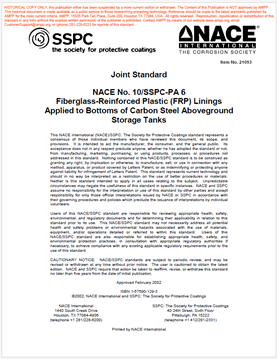Metallic material requirements for resistance to sulfide stress cracking (SSC) for petroleum production, drilling, gathering and flowline equipment, and field processing facilities to be used in hydrogen sulfide (H2S)-bearing hydrocarbon service. Historical Document 1995
Product Number:
21302-HD1995
Author:
NACE International
Publication Date:
1995
$179.00
$179.00
$179.00
This NACE standard (materials requirement) is one step in a series of committee studies, reports, symposia, and standards that have been sponsored by Group Committee T-1 (Corrosion Control in Petroleum Production) relating to the general problem of sulfide stress cracking (SSC) of metals. Much of this work has been directed toward the oil and gas production industry. Many of the guidelines and specific requirements in this standard are based on field experience with the materials listed, as used in specific components, and may be applicable to other components and equipment in the oil production industry or to other industries. Users of this standard must be cautious in extrapolating the content of this standard for use beyond its scope.
The materials, heat treatments, and metal property requirements given in this standard represent the best judgment of Task Group T-1 F-1 and its sponsoring unit committee, T-1 F, on Metallurgy of Oilfield Equipment.
1.1.1 This standard presents metallic material requirements for resistance to sulfide stress cracking (SSC) for petroleum production, drilling, gathering and flowline equipment, and field processing facilities to be used in hydrogen sulfide (H2S)-bearing hydrocarbon service. This standard is applicable to the materials and/or equipment specified by the materials standards institutions listed in Table 5 (or by equivalent standards or specification of other agencies). This standard does not include and is not intended to include design specifications. Other forms of corrosion and other modes of failure, although outside the scope of this standard, should also be considered in design and operation of equipment. Severely corrosive conditions may lead to failures by mechanisms other than SSC and should be mitigated by corrosion inhibition or materials selection, which are outside the scope of this standard. For example, some lower- strength steels used for pipelines and vessels may be subjected to failure by blister cracking or stepwise cracking as a result of hydrogen damage associated with general corrosion in the presence of H2S. Also, austenitic stainless steels and even more highly alloyed materials may fail by a type of chloride stress corrosion cracking that is promoted by elevated temperature, aggravated in some cases by the presence of H2S.
Historical Document 1995




